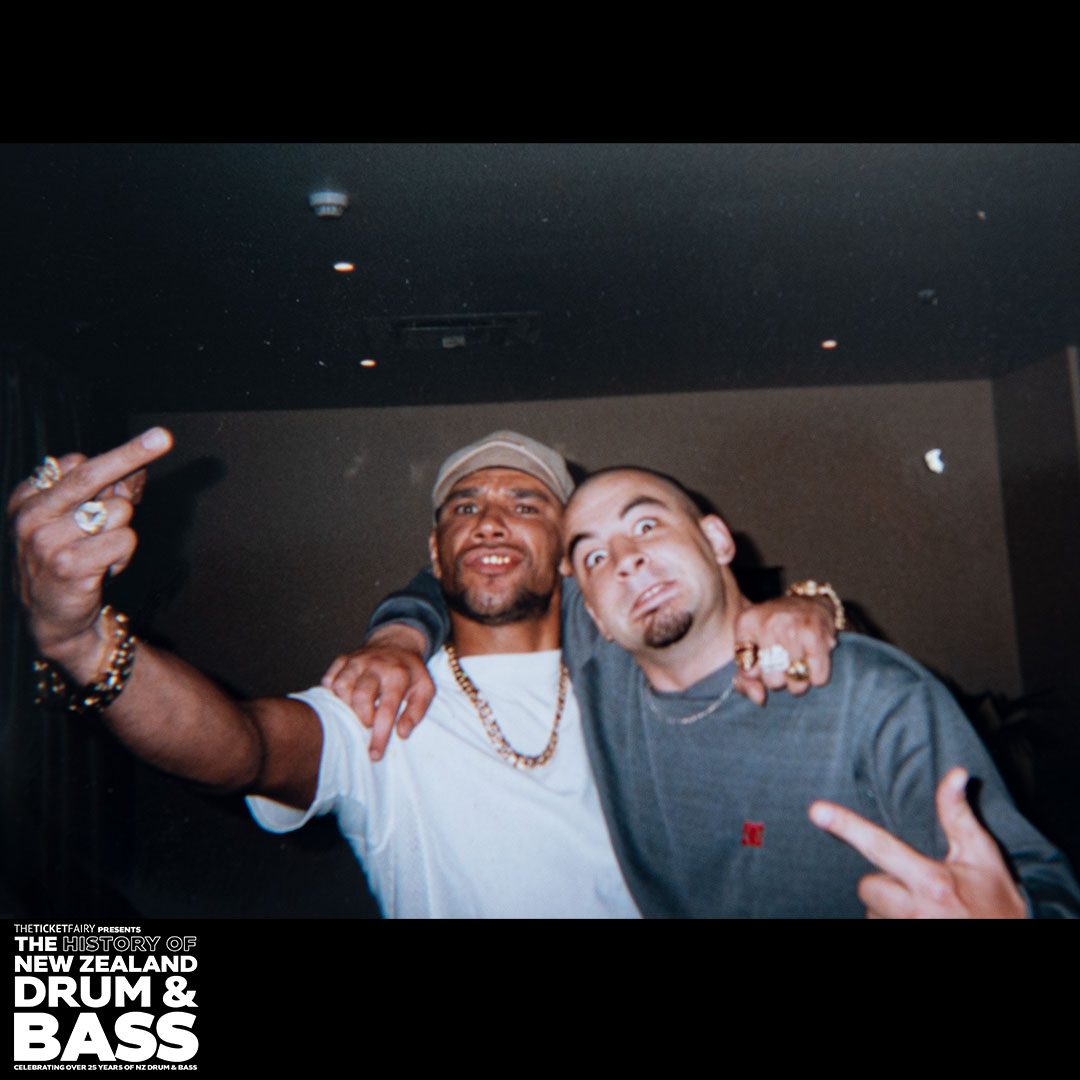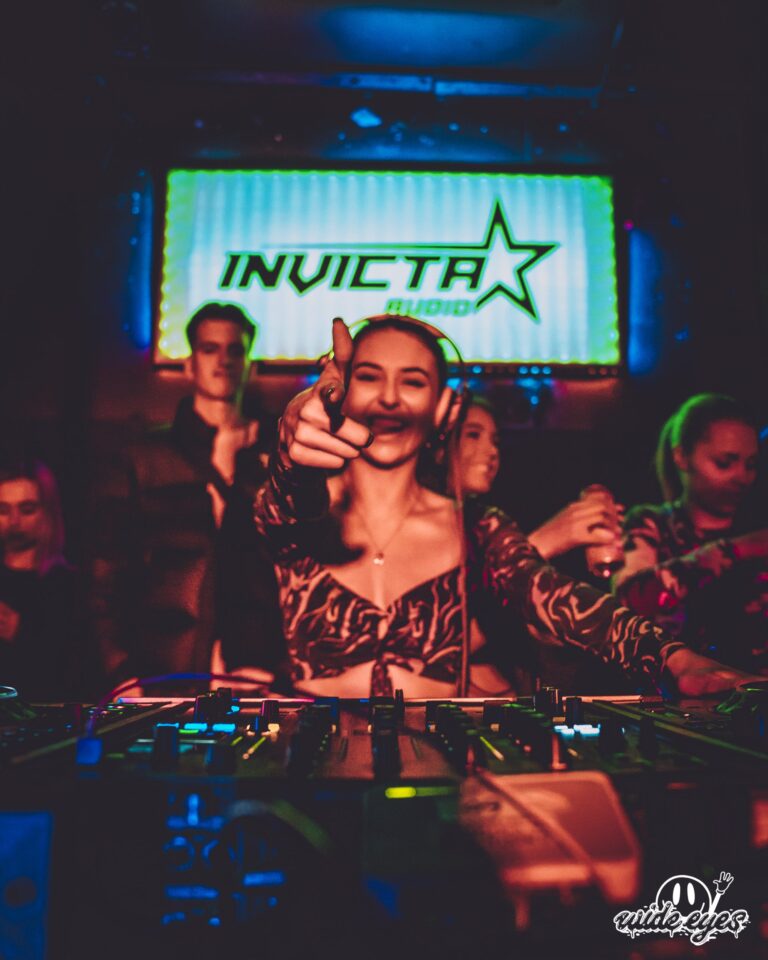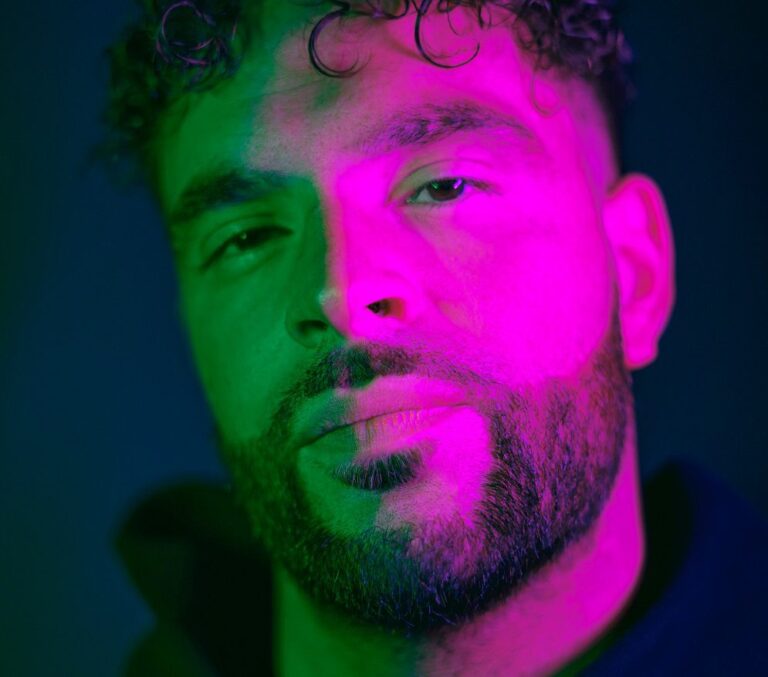What started off as a project to keep cabin fever at bay during lockdown has now become one of the most consistent and biggest D&B history podcasts of all time… The History Of New Zealand Drum & Bass is now 30 episodes deep, has a listenership of over 60,000 D&B fans and features some of the most respected artists from both hemispheres.
dBridge, Doc Scott, Bailey, Need For Mirrors, Klute, Digital, FIERCE, MC Tali, Emma G, A-Sides, Concord Dawn and many, many more have contributed to the series so far. Speaking at length and candidly, the series doesn’t just capture Kiwi D&B history but reflects on the scene’s global development and what was happening at the same points in the UK.
The man behind the podcasts is Jay Monds AKA Bulletproof. A certified OG of the Aotearoa drum & bass scene, Jay helped dig the foundations in Auckland and Christchurch in the mid to late 90s and was part of the first generation of drum & bass producer exports from the country alongside Concord Dawn, Shapeshifter, The Upbeats and State Of Mind.
Switching to dubstep and 140 in the early 2010s, then taking a break from music altogether to focus on his broadcasting career, Jay’s historical investigations have brought him full circle to a passion and craft that’s he’s been part of since the very beginning. Check out his podcasts on Spotify for some deep history and perspectives on New Zealand drum & bass, and read on for some deep history on the man himself…
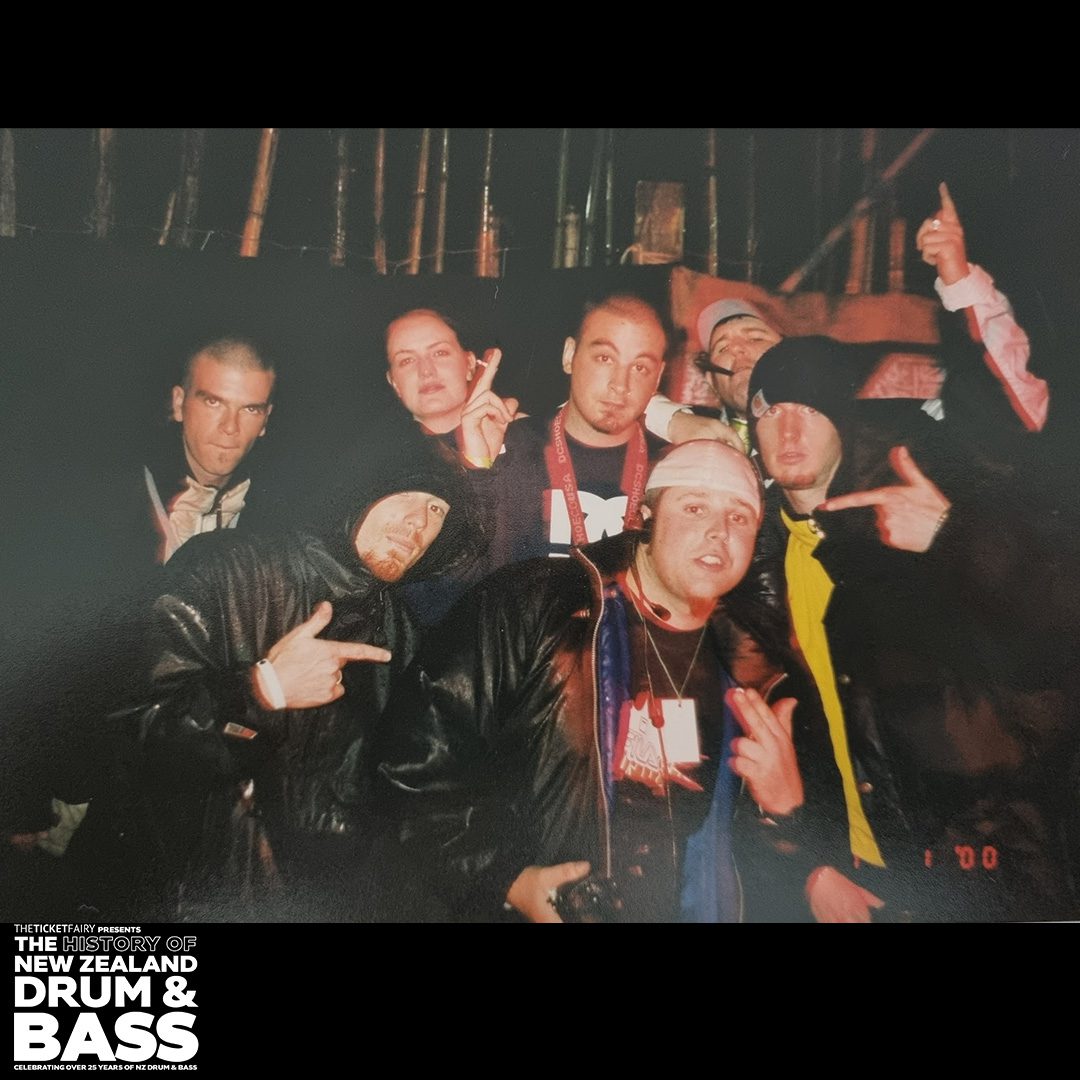
You go back to the very start of the New Zealand D&B scene…
Yeah, as it’s been said throughout the podcast, The 90s was something special, regardless of what D&B was up to; Skateboarding, graffiti and that whole lifestyle I was living was special. I had this conversation with Mo from Need For Mirrors; you don’t realise how special and significant the things you’re doing are at the time, it’s only when you look back 20 or 30 years down the track that you realise how important it all was on a scene level.
Yeah totally. I’ve spoken to Joe many times and I also love his stories about coming over here and pretty much knocking on Krust’s front door. Tali’s got great tales of her first UK trip, too.
We all have. Us Kiwis aren’t shy of looking a gift horse in the mouth. Any time one of those early pioneers came over and gave us their number or aim handle it was absolute gold and we’d always really try and capitalize on any opportunity if we came over to the UK. I remember coming over and cutting dubs with Storm at Music House and having access to all the new Headz DATs. Going out for dinner with some of my heroes like Jayne and Keaton and being like, ‘What am I doing here? This is unreal!’
Yeah totally but promoters and representers in faraway territories become like extended family for touring artists…
And there’s no shortage of UK guys who’ve decided to spend a lot of time out there. They’ve made New Zealand a base for a few months at a time and really became part of the community here and made very deep connections and friendships. At first it was like, ‘Wow these dons are coming over.’ But it developed into being as blasé as, ‘Oh Tom’s over soon, or Steve’s on his way…’
Awesome. Who was the first person you personally brought over?
For me and Josh who I started Bulletproof with it was Kemal and Rob Data, Konflict. They came over for the 99/2000 NYE and they played at the festival called The Gathering. They headlined and stuck around for a while to play a couple of side shows. That for us was huge. They were our heroes and inspirations and the reason we knuckled down and started producing properly. They’d become our friends and it got the point where Kemal would play me DATS on the phone and ask me which ones I wanted him to cut at music house and then he’d post them to me.
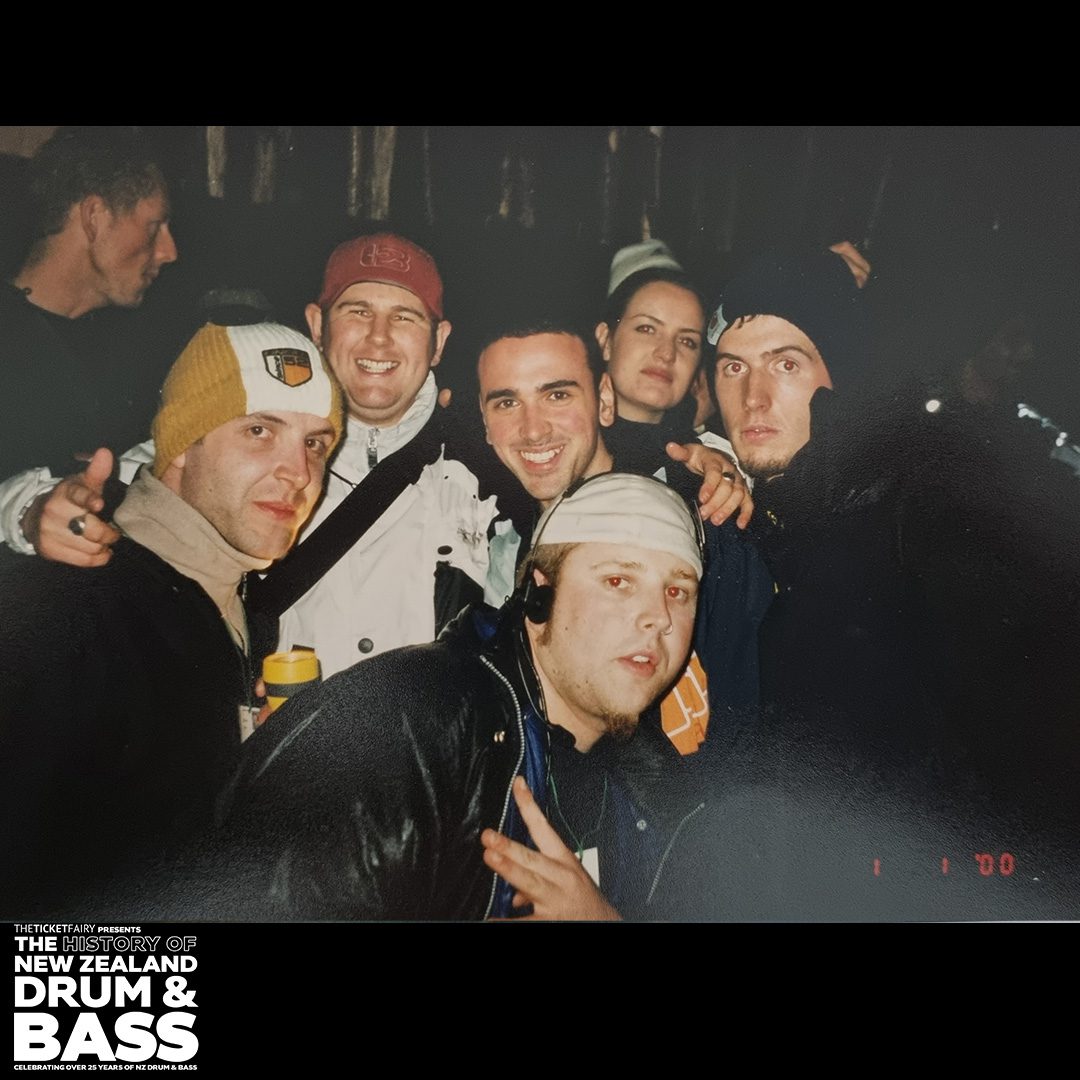
Wow
Yeah crazy right? I realise how lucky I was when I tell that story. For them, they were buzzing to have their music supported so far away from the UK. We’d be playing their dubs and getting their music on student radio over here so, by the time they came over to tour, people would be dying to hear their new stuff. That NYE was the first time we heard Messiah, The Hypnotist, Star Trails, Obsidian and all these other groundbreaking tunes. It helped push the production scene over here as well as the music scene.
Totally. Concord Dawn were the earliest protagonists in the New Zealand producer scene, right?
Pretty much! Those lads will claim that we (Bulletproof) were the first to introduce the world to New Zealand drum & bass production but Concord Dawn were the first to blow up locally, then internationally and become a household name for D&B over here – before Shapeshifter and The Upbeats. I’d come back after months away on tour and they were all over the radio and these massive line ups. It was like, ‘What the hell?’ But we were all mates and that gave us a lot of inspiration and a push. Any exposure and promotion one of us got, we would all celebrate and benefit from. The energy behind that was inspiring.
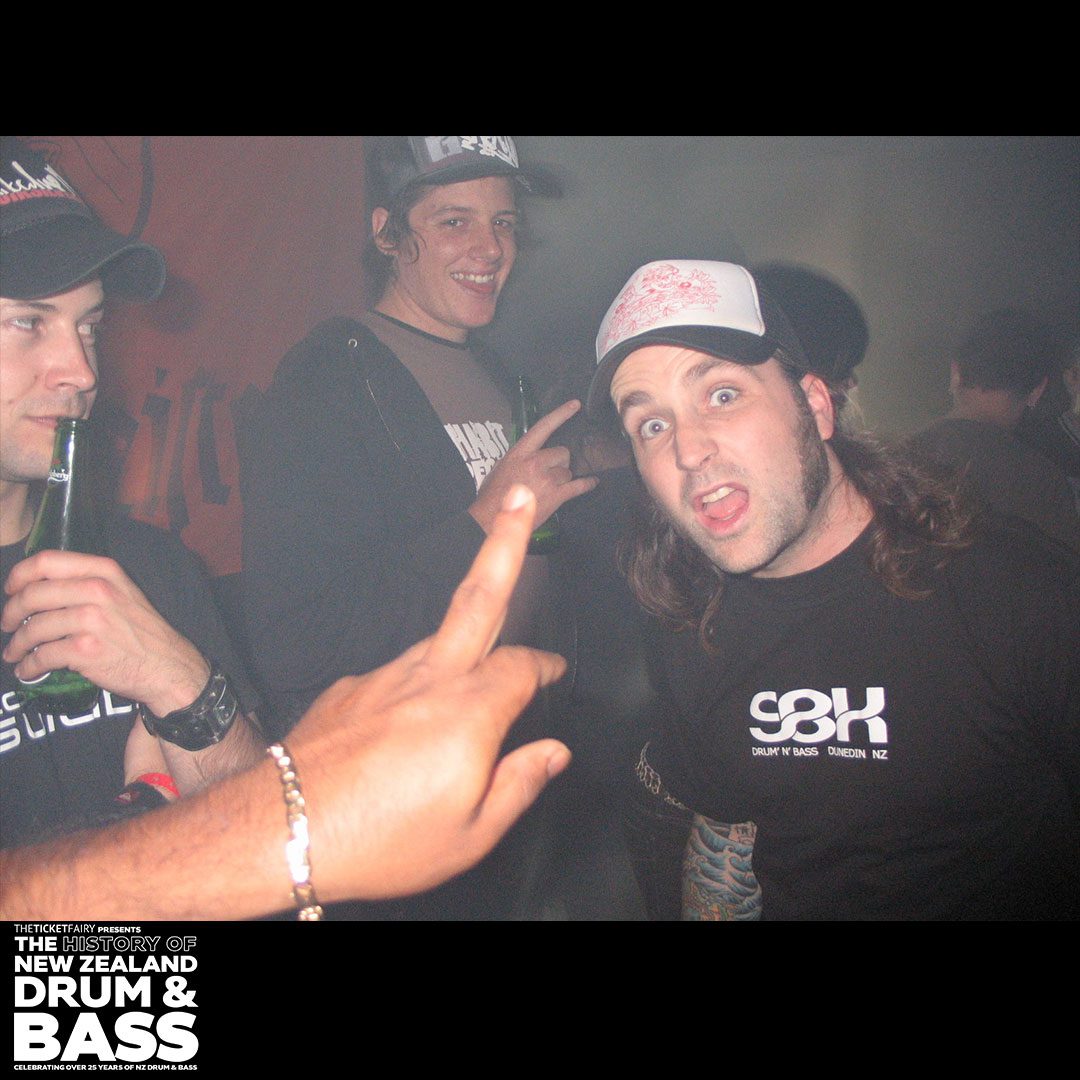
I love how interconnected everything is in New Zealand. Like hearing about MC Slave being one of the first MCs on drum & bass in the mid 90s and he’s part of Fat Freddy’s Drop. Or like Tiki Taane whose fingerprints are all over all electronic music from Aotearoa.
That’s all small country vibes though, you know? Back then the population was around 3.5 million and the scenes were so small, so we were very protective over what we had. We wanted to keep things underground so we would gravitate towards each other. And also before the internet we’d get excited if we heard an English accent. Like, ‘Oh wow you’re from the UK, what do you know about drum & bass?’ Any type of tapes people would have we’d record them and treasure them.
But then were also points where we’d realize we’re part of a global community. I remember DJing grime for Wiley in Christchurch in 2018 and a guy comes up to me and he knew about my music and had seen me play at The End for Renegade Hardware in 2008. So that connectivity and tightness went much further than New Zealand, right?
Yeah! And now across more multiple generations. What’s the relationship like between the New Zealand pioneers and the new generation of artists killing it there now?
It’s great. I love how appreciative they are of the scene’s history here. There’s a hunger to know about their past and where things come from. It’s become a much bigger beast now with so many different styles and subgenres and audiences – the mainstream festival audiences, the underground nights and how they feed into each other. It gets big, it goes back underground; It’s this cycle that’s gone on since the early days but it’s on a much bigger scale now. The main sound for 16/17 year olds now is mainstream drum & bass – your Dimensions, Frictions, Netskys, Wilkinsons and Lee Mvtthews etc
New Zealand was global D&B HQ for a bit during lockdown times…
It really was. I produce and host another podcast series for Mitch and the team at Audiology Touring called VISIONZ, which focuses on the new generation of artists. A lot of people like Hybrid Minds, Koven, Pendulum, Camo, Krooked, Mefjus and Delta heavy have all said New Zealand was one of the most important places for D&B because, for a while, it was the only place they could test out productions and things like that.
Yeah I spoke to Wilkinson and most of his album was first roadtested in New Zealand!
Same with Friction. He was testing out a lot of Shogun stuff over here. I take my hat off to Ed. He’s really invested in Kiwi artists and has been since his first Concord Dawn collaboration. I love how he’s investing in Flowidus now too. When that happens for Kiwi artists it’s so awesome to see and we all get behind it.
Lee Mvtthews too…
Oh totally. Those boys are crushing it. I sat down with them in 2017 when I was working at George FM to basically work out how I could help them break the scene. They were making trap and 140 type stuff so we made a commercial track and that went huge over here and was one of their first breakthrough singles. That was their foot in the door in Aotearoa music and since they’ve upped the tempo to 174 they’ve just blown up and are consistently in the charts. It’s very inspiring.
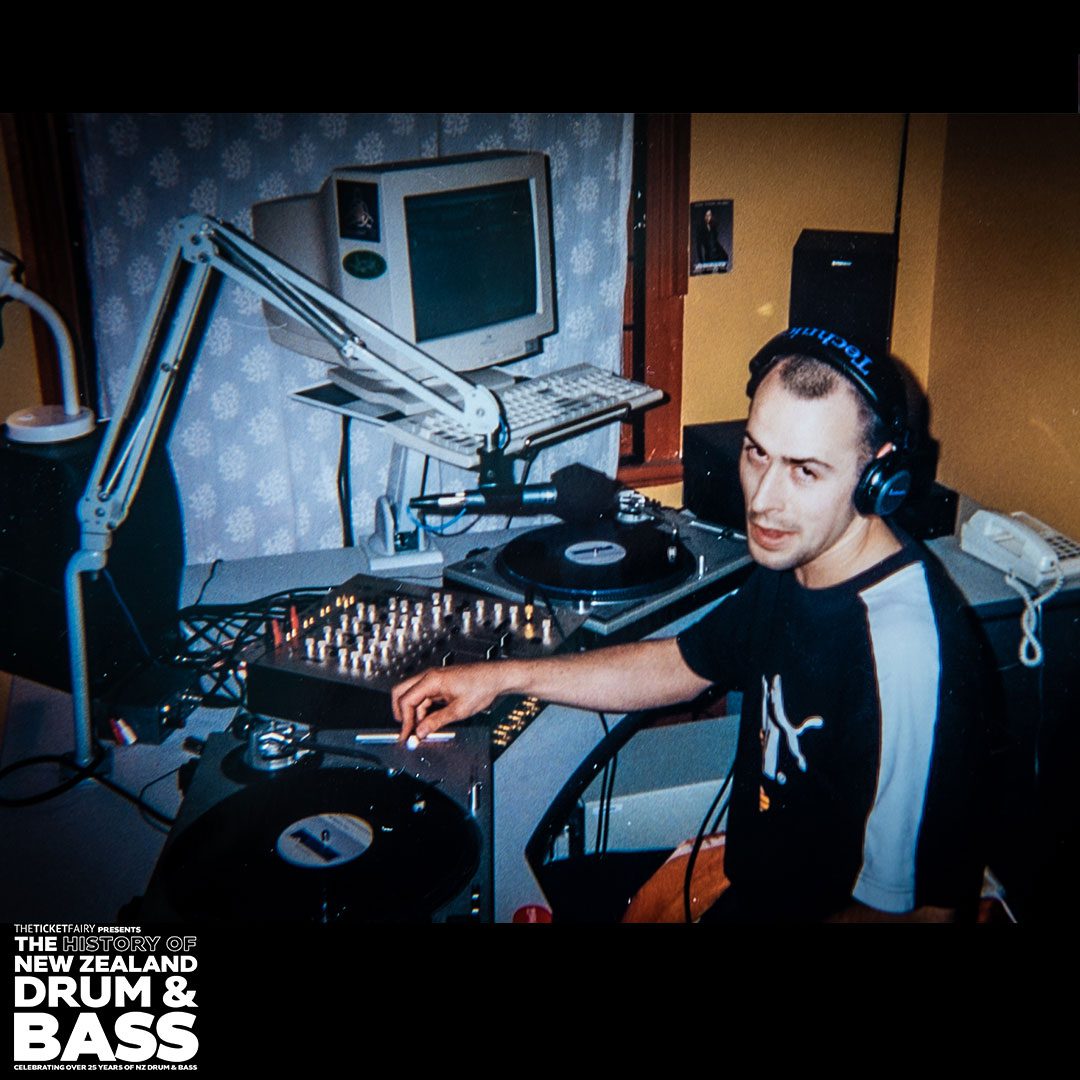
George FM is a big driver for D&B in New Zealand isn’t it?
Absolutely. George is a great starting point for new fans of the music. I left George FM back in 2018 before this current explosion in D&B popularity out here, but in 2016 I was initially brought in to re-brand, host and curate the night shows. The Station Manager at the time had a saying – daytime for ratings, night time for reputation. I took that literally and got some of the top global house, bass and D&B labels doing shows. I gave The Upbeats their own summer residency, had Trei and Concord Dawn coming up for regular shows plus international names rolling through when they were in town. The best part was being able to platform a new era of up and coming Kiwi artists who are now global names, Montell 2099, Quix, Lee Matthews and Flowidus for instance.
Was broadcasting the thing that took you out of the studio?
In a way yeah. In 2010 I was still making D&B but began dabbling in the 140 tempo range, I was looking for something new and was inspired by Truth and Optimus Grime. My first 140-based album won an AMA (Aotearoa Music Award) for Best Electronic Album – It’s the New Zealand version of a Grammy and not long after I signed to EMI for a 3 album deal. In 2014 I’d come off the back of some really hot albums, but was in a different place musically and made a laid back jazzy concept album. Of course, It didn’t sell and I was pretty much dropped from EMI/Universal overnight. That left a bad taste in my mouth. I was thinking about what I would do next. I always loved being on the radio and breaking new music, so when the opportunity to be on the frontline and help other people be heard came about, I was sold. It was such an exciting and rewarding thing to do.
And a rewarding part of telling stories via the podcast and getting the history out there…
It is. It happened by accident. There was a 20 minute history of D&B story on RNZ (Radio New Zealand) back in 2019 and I thought, ‘Man someone should do a proper podcast about the history of D&B over here.’ I didn’t think about it until the august 2021 lockdowns happened here, but I knew I’d go stir crazy if I didn’t do something, so I started the podcast.
The first 10 episodes were just me chatting to friends and recording them – talking about drum & bass and shit back in the day. Since then it’s become much more structured. Now things are taking a different direction and I’m very focused on certain aspects of overall D&B history. Over 60,000 people use the platform now, which is amazing, and a lot of people get in touch and want to know certain things. Or they get in touch to say that I’ve asked the questions they always wanted to know the answers to. So the audience is very involved in the podcast which makes it even more special.
That’s brilliant. There are so many great stories in the series. The amount of times so many people have almost died in dodgy journeys to and from events…
Oh bruv! On multiple occasions. Mainly from one party. Some of the drivers who were of the mindset of, ‘Yeah I can stay up for three days straight and drive some of the world’s most important D&B artists on dodgy mountain roads and not fall asleep at the wheel, no worries mate she’ll be right!’ Hahaha.
Haha. Tell us some more stories…
One that’s popped up a few times in the history podcast from the early era are Goldie’s first visits. Back then he was…well…Goldie! He was the superstar of the scene and it felt like he didn’t give a fuck. Proper B-boy vibes. For those who were witnessing the don in action for the first time, he could come across as a little bit dangerous… D-Rve and Geoff Presha from Subtronix would assign him bouncers and he’d be like, ‘Why would I need bouncers?’ And they were like, ‘No mate, they’re not here to protect you , they’re here to protect the crowd!’ Regardless, G would always crush it and end up in the middle of the floor raving with kiwi fans with a bottle of vodka and sweat dripping from the roof, and those were some historic scenes. But most of the really interesting things for me come from the Kiwi artists – seminal parties we did and definitive moments for our own scene and culture.
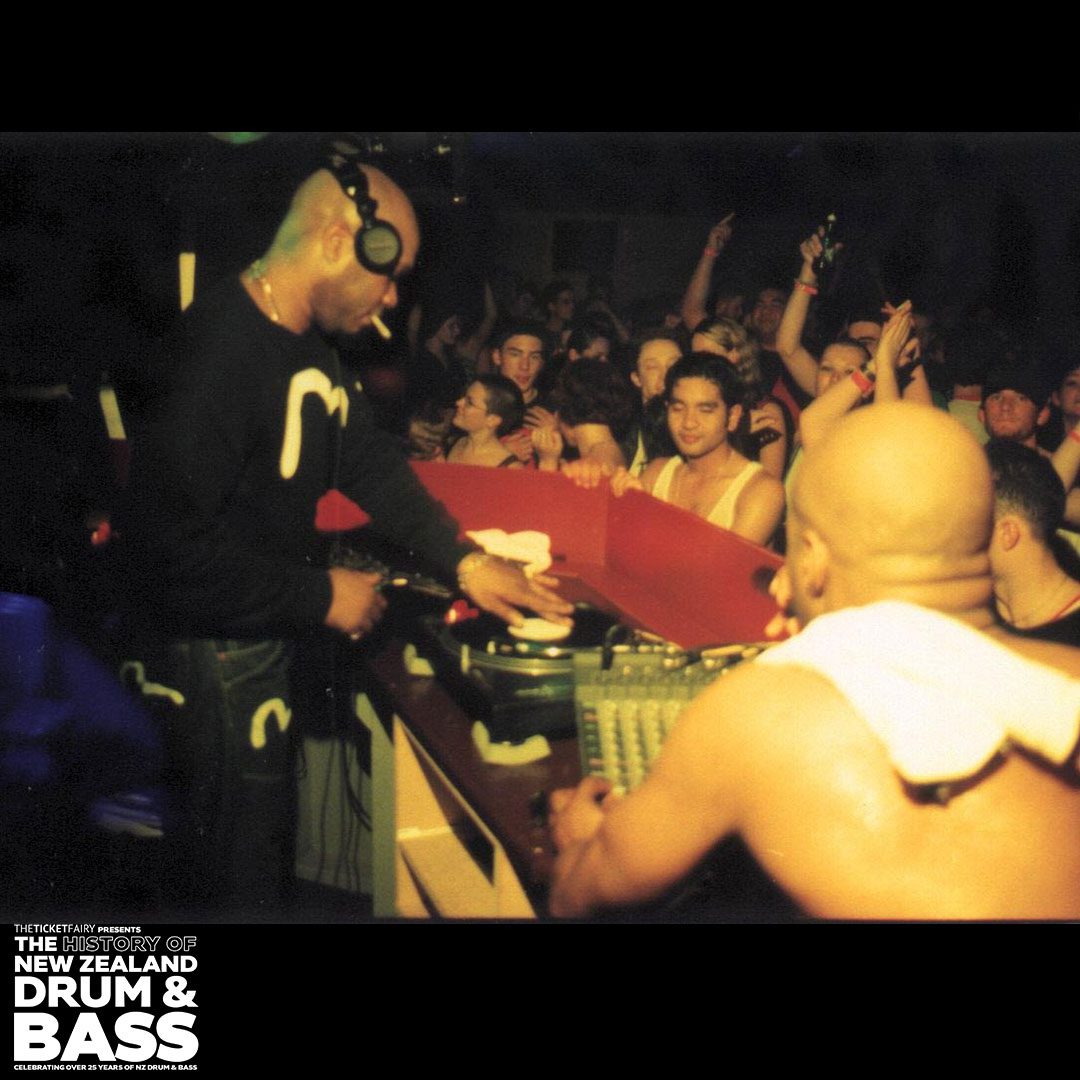
What was a definitive moment for you personally?
For me that was when Grooverider first came out in 1995. He started with the DJ Trace remix of Mutant Jazz and were all standing there like ‘Wow’ It was my first time taking a pill and just one of those magical nights when I discovered how deep and futuristic this music is. Nick D sums it up perfectly in Episode 017 – “it’s that realisation about dubplate culture like, ‘Oh my god, in London they’re dancing to music from the future!’ And we’d feel like that for one night only. Grooverider, SS and Warren G, Bryan Gee and Moose, Doc Scott and Justyce – these guys came over and shaped the future of our scene. We’d be train spotting every tune and often would (illegally) record the DJs mixes and study them. Those tapes would circulate the country and scenes would grow. There are too many moments like that.
Ah wow. Do you have any of those mixes archived?
Yeah a lot of these tapes do exist and there’s a whole movement of people archiving and digitising them. I’ve just uploaded “Lost” mixes from Fierce & Nico, and DJ Trace, and Ed Rush all from the 90’s to patreon.com/nzdnbpodcast It’s awesome. I’m hoping to get my hands on more and use them in podcasts. There’s one in particular… A Dom & Roland mix which the crowd screamed so loud on the noise went through the needle and you can hear it in the recording.
Wow. No way!
Crazy, right? We thought that was a forgotten part of New Zealand drum & bass history so it’s great to know there are people out there who cared as much as we did and kept hold of those tapes.
Brilliant. I think drum & bass and jungle has reached a certain stage in its maturity and it echoes through the generations. Like how 60s rock did in the 90s.
Totally. I think the new generation have also impressed the old generation too. The way the heads are having homage paid to them. The respect from younger artists and fans and the way they are referencing the old school is very important in that way. The way they’re doing it is exciting too – it’s not nostalgic or copying the old school. It’s done in a very creative way.
Definitely! So you’re neck deep into season three. How will the podcast develop?
I’ve actually finished recording the 3rd season. For the future, I can’t say too much, but the plan is to tie all these interviews together and record a lot more. I want to create a documentary podcast that really documents the history of the scene here and in the UK, with each episode focusing on specific years going from the early 90’s roots to the present day.
That sounds amazing. Could this bring you back into the studio as well musically?
Kinda. I’m already back! I’ve literally just dropped my first release in years on the Optiv album. Idiom. Optiv was a very dear friend and hugely important to Bulletproof making a name in D&B. He used to joke that he’d find a way of making me come back to drum & bass. It’s the first D&B tune I wrote since 2010. We usurped his samples when he first came over here 20 years ago, and I used them in Idiom, so to me the whole track is really a celebration of Optiv and Cause 4 Concern and sounds a lot different to what I used to make.
Amazing you’ve kept his samples. Great archiving!
Hell yeah man, I’m not letting those samples go. They’re gold! I’ve looked after that folder like my life is worth it, and gave them to pretty much all the OG NZ D&B heads hahah. So yeah, I am back in the studio and it’s down to the podcast – returning to drum & bass has totally inspired me and that’s only going to develop more, all things according to plan.
That’s amazing. What’s next?
Full weekly episodes from Season Three drop on Spotify, Apple Music and all major platforms from October 4, and advance access with exclusive content and audio is available now via patreon.com/nzdnbpodcast. I’ve been exploring how things evolved during the late 80s and early 90s acid house and rave scenes in the UK and speak to people who were there as jungle exploded and this thing we call drum & bass emerged. Guys like Fierce, Klute, Digital and Bailey. Locally, I speak with guys like Need for Mirrors and Agent Alvin who were huge part of the early NZ scene. Optimus Grime is a Kiwi artist who came from D&B and went on to help spearhead the dubstep movement over here, and has some interesting chat about the effect dubstep had on D&B in New Zealand. I also shine light on Emma G, and B-Line – two of NZ’s first female DJs who were hugely instrumental in the early days of Kiwi Drum & Bass from 97’ onwards. All those episodes are available now for the Patreon subscribers and will be available in full very soon on Spotify and all major podcast platforms.
Support The History Of New Zealand Drum & Bass podcasts on Patreon
Listen to The History Of New Zealand Drum & Bass podcasts on Spotify
Follow The History Of New Zealand Drum & Bass: Facebook / Twitter / Instagram / YouTube
